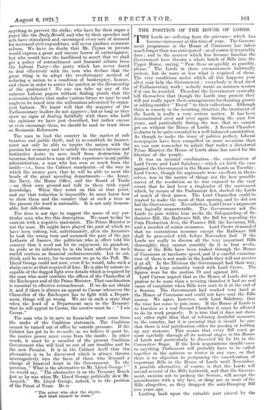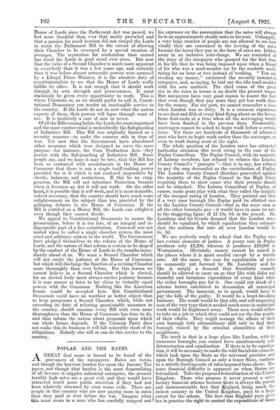THE POSITION OF THE HOUSE OF LORDS. T HE Lords are
suffering from the grievance which has become customary at this time of year. The Govern- ment programme in the House of Commons has taken much longer than was anticipated—as of course it invariably does ; and in the manner which has become familiar the Government have thrown a whole batch of Bills into the Upper House, saying, " Pass these as quickly as possible, please." The Lords in these circumstances habitually protest, but do more or less what is required of them. The very conditions under which all this happens year after year help the Government ; everybody is dead tired of Parliamentary work •, nobody wants an autumn session if it can be avoided. Therefore the Government cynically tell themselves that though the Lords may protest they will not really upset their arrangements for shooting grouse or adding another " Royal " to their collections. Although there is comedy in the recurring situation, the treatment of the Lords is really a very serious matter. It has been demonstrated over and over again during the past few years, and particularly during the war, that we cannot get on without the House of Lords. A Second Chamber is shown to be quite essential to a well-balanced constitution. As though to make the irony of politics perfect, Liberal newspapers have been compelled on more occasions than we can now remember to admit that under a dictatorial Prime Minister the House of Lords alone has cared for the liberties of the people. It was an unusual combination—the combination of Lord Crewe and Lord Salisbury—which set forth the ease against the Government in the House of Lords on Tuesday. Lord Crewe, though his arguments were excellent in them- selves, was in the nature of things not the best possible. mover of the resolution as he was exposed to the easy retort that he had been a ringleader of the movement which, by means of the Parliament Act, docked the Lords of much of their power. The Lord Chancellor could be trusted to make the most of that opening, and he did not fail the Government. Nevertheless, Lord Crewe's argument was logically unanswerable. The Government ask the Lords to pass within four weeks the Safeguarding of In- dustries Bill, the Railways Bill, the Bill for repealing the Corn Production Acts, the Finance Bill, the Licensing Bill, and a number of minor measures. Lord Crewe demanded that no contentious measure except the Railways Bill shall be proceeded with before November 2nd. If the Lords are really to discuss all the very important Bills thoroughly, they cannot possibly do it in four weeks. Some of the Bills have been rushed through the House of Commons at racehorse speed, and if a careful examina- tion of them is not made in the Lords they will not receive it at all. In the Division the Government had their way, although a large minority voted with Lord Crewe. The figures were for the motion 79 and against 101. Lord Curzon argued that as the House of Lords did not profess to be more than a revising chamber it had no real cause of complaint when Bills were sent to it at the end of a Session. The Government had worked very hard in the House of Commons and could not have sent the Bills sooner. We agree, however, with Lord Salisbury, that the time has come to join issue. If the House of Lords is to function as a real Second Chamber it must be allowed to do its work properly. It is true that it does not claim any other right than that of referring doubtful measures to the country, but it is essential that it should be sure that there is real justification either for passing or holding up any measure. This means that every Bill must go most carefully through all its normal stages in the House of Lords and particularly be dissected bit by bit in the Committee Stage. If the Irish negotiations should come to anything, Parliament will probably have to be called together in the autumn or winter in any case, so that there is no objection to postponing the consideration of important Bills in the House of Lords until November. A possible alternative, of course, is that the Lords will amend several of the Bills forthwith, and that the Govern- ment, anxious not to prolong the Session, will accept the amendments with a wry face, or drop one or more of the Bills altogether, as they dropped the anti-Dumping Bill two years ago. Looking back upon the valuable part played by the House of Lords since the Parliament Act was passed, we feel more thankful than ever that sanity prevailed and that a passion for mock heroism did not compel the Lords to resist the Parliament Bill to the extent of allowing their Chamber to be swamped by a special creation of peerages. The reputation for moderation then earned has stood the Lords in good stead ever since. But now that the value of a Second Chamber is much more apparent to everybody than it was a few years ago, and certainly than it was before almost autocratic powers were assumed by a LibeIal Prime Minister, it is the absolute duty of constitutionalists to see that the House of Lords really fulfills its office. It is not enough that it should work through its own strength and perseverance. It must studiously be given every opportunity to work. This is where Unionism or, as we should prefer to call it, Consti- tutional Democracy can render an inestimable service to the country. If the. Lords do not do now what the nation expects of them, their powers will lapse through want of use. It is positively a case of now or never.
Of all the Bills coming before the Lords the most important and the most controversial is undoubtedly the Safeguarding of Industries Bfll. This Bill was originally framed as a security measure—to make the country safe in time of war. Yet now that the Government have abandoned other measures which were designed to serve the same purpose—for instance, the Corn Production Acts—they persist with the Safeguarding of Industries Bill. Some people say, and we hope it may be true, that this Bill has been so contorted with amendments in the House of Commons that there is not a single tariff-making power provided for in it which is not rendered inoperative by checks, balances, and restrictions. If this be no exag- geration, the Bill will not introduce Protection because when it becomes an Act it will not work. On the other hand, it is possible that it will work, and it is most desirable, indeed necessary, that the country should have much more enlightenment on the subject than was provided by the galloping debates in the House of Commons. If the Bill is certified as a Money Bill, the Lords can enlighten even though they cannot decide.
We appeal to Constitutional Democrats to ensure the preservation, before it is too late, of an integral and in- dispensable part of a free constitution. Cromwell was, not misled when he called a single chamber system the most cruel and arbitrary system in the world. The Government have pledged themselves to the reform of the House of Lords, and the nature of that reform is certain to be shaped by the conduct of the House of Lords in the months imme- diately ahead of us. We want a Second Chamber which will not excite the jealousy of the House of Commons, but which will discharge the function of a revising Chamber more thoroughly than ever before. For this reason we cannot believe in a Second Chamber which is elected, for an elected body most always excites jealousy because it is sure sooner or later to lay claim to virtually equal powers with the Commons. Nothing like the American Senate would be accepted here. But Constitutional Democrats could have no worthier or better object than to keep prosperous a Second Chamber, which, while not exceeding its duty of referring questionable measures to the country, should examine every Bill with even more thoroughness than the House of Commons has time to do, and thus inform the nation about proposals upon which our whole future depends. If the Unionist Party does not make this its business it will fall miserably short of its obligations. Nobody else will or can do-this service to the country.



































 Previous page
Previous page